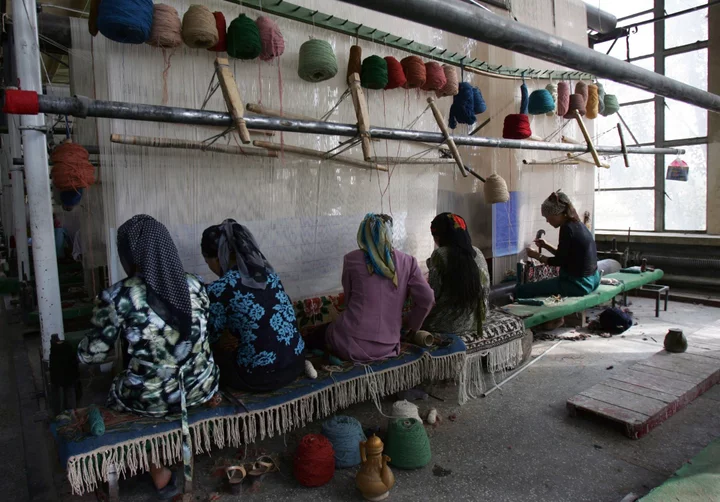The US expanded a ban on imports from China’s Xinjiang region, placing two more companies on its so-called entity list, the first additions since a law targeting forced labor in the area took effect a year ago.
Printing and imaging company Ninestar Corp. and eight of its subsidiaries, as well as Xinjiang Zhongtai Chemical Co. Ltd., were added to the list “for working with the government of Xinjiang to recruit, transport, transfer, harbor or receive forced labor” involving Uyghur and other ethnic minorities, the US Department of Homeland Security said in a statement Friday.
That widens the list to 22 companies, including solar material manufacturers Xinjiang Daqo New Energy Co. and Hoshine Silicon Industry (Shanshan) Co., Ltd., as well as the state-affiliated Xinjiang Production and Construction Corps.
“These enforcement actions send a clear message to the importing community,” Robert Silvers, the DHS under secretary for strategy, policy and plans, said in an interview. “Companies must know their supply chain.”
The move is certain to anger China, just as the the US seeks to mend deteriorating ties. Secretary of State Antony Blinken is said to be planning an official trip to China in the coming weeks, possibly including a meeting with President Xi Jinping.
China’s Ministry of Foreign Affairs, Ninestar and Zhongtai Chemical didn’t immediately respond to Bloomberg requests for comments sent outside normal business hours.
Read more: Forced Labor Dispute Is Completely Redefining US-China Relations
The Uyghur Forced Labor Prevention Act, which came into force last June, bars imported goods partly or wholly made in China’s Xinjiang, unless companies can prove the products have no ties to forced labor.
More companies may be added to the list, Silvers said. “There’s a pipeline of cases,” he said.
Congress passed the law unanimously with support from labor unions and activists. It seeks to put pressure on Beijing for allegedly detaining minorities in Xinjiang, an autonomous region in northwestern China that’s home to millions of Uyghurs.
Some $1.3 billion in shipments were subjected to special inspections since last summer because of indications that they might be the product of forced labor, Silvers said.
No exemptions have been granted because no entity has been able to provide clear and convincing evidence that the goods are free of forced labor, he said.
China has been accused of incarcerating more than 1 million Uyghurs in recent years, and for forcing Muslim citizens into forced labor, including the harvesting of cotton. Beijing has repeatedly denied that it’s committing such human-rights abuses.
A 2022 report by the Helena Kennedy Centre for International Justice at Sheffield Hallam University in the UK mentioned state-owned Xinjiang Zhongtai, saying it had accepted more than 5,000 workers through state-sponsored transfers, more than any company the authors documented.
--With assistance from Amanda Wang.
(Adds attempts to obtain comments in sixth paragraph.)

